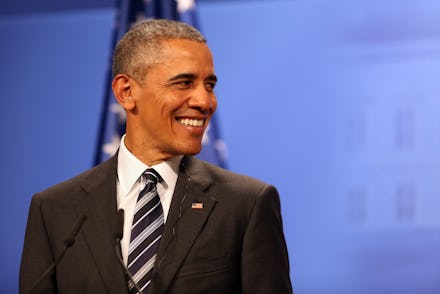Obama Just Gave Millions of Americans a Pay Hike — And They Probably Didn’t Even Notice

The Obama administration on Wednesday will issue an update to a long-neglected Department of Labor regulation, which will extend overtime pay protections to more than 4 million Americans currently ineligible for them. The administration estimates the shift will increase wages for workers by $12 billion over the next decade, according to a White House email.
The updated rule, which goes into effect in December, doubles the current salary threshold under which employers are required by law to pay their salaried workers overtime, raising it from $23,660 to $47,476 per year.
The rule has been updated only once in the past 40 years, and the share of workers covered by it has fallen from over 60% in 1975 to about 7% today, according to the White House. The new salary threshold is set at the 40th percentile of what full-time salaried workers earn in the region of the United States with the lowest income.
Workers covered in accordance with Fair Labor Standards Act, which was passed in 1938, must be paid 1.5 times their regular pay rate for every hour they work beyond a 40-hour workweek. Hourly workers in most blue-collar and service industry jobs are covered by the FLSA.
Read more: Obamacare Just Made History for the Best Possible Reason
Salaried workers, however, are subject to different rules. If they make less than the salary threshold, they are guaranteed overtime pay, but if they make more than the threshold and they fall into the categories of executive, administrator, or professional, their overtime work can be exempt. The logic is that white-collar workers typically have the kind of pay and power in determining their work schedule, so that merits an exception to overtime protections.
Advocates for worker rights were hoping that the rules regarding the white-collar exception would be updated as well, but the Obama administration has refrained from doing so, citing concerns that it would upset the business community.
The criteria for sorting workers into the exempt white-collar categories — commonly called "duties tests" — are notoriously prone to exploitation by employers. For example, many businesses are known to categorize poorly-paid, low-skilled workers as managers, even though their jobs only nominally involve high-level duties such as supervision or employee training. As the Economic Policy Institute notes: "[A]n assistant manager at a fast-food restaurant with a salary of $24,000 and who spends 95% of his (or her) time cooking fries, running a cash register and sweeping floors can be required to work 60 or 70 hours a week and yet be denied any overtime pay, simply because he's classified as a manager."
Mixed feelings: The administration's failure to revisit the white-collar exemptions has left some advocates dissatisfied.
"They're doing half of the job — the bright line part of it," Judy Conti, the federal advocacy coordinator at the National Employment Law Project said in a phone interview. "What the Obama administration is doing is great, and if they had to do one or the other part of overtime regulation, this is the one to do, but it's also important to look at the duties test."
Conti said that the duties test should be reformed so that only people whose actual day-to-day work is mostly composed of high-level work like management should be considered eligible for exemption.
"We hope the next administration will finish the job," she said.
The new salary threshold is a few thousand dollars lower than the one that the Obama administration floated last year, and significantly lower than the ones called for by some progressive advocates, such as the $69,000 floor that the billionaire entrepreneur Nick Hanauer proposed in 2014.
"Let labor standards go for too long, you really can't catch up again." — Judy Conti
A crucial element of the update is that the threshold is now set to automatically increase every three years to continue to match the 40th percentile of full-time salaried workers in the country's lowest income region. The White House estimates that in 2020 the new threshold will rise to over $51,000.
The new threshold still covers a far smaller share of the workforce than overtime protections did during their 1979 peak. But given the Obama administration's fear over pushback from the business community, a bigger jump in the salary threshold would have to come from a future administration.
"We're a victim right now of how much the regulation has eroded over time," Conti said. "It would be really hard to get it up [as high as it was in 1979] — let labor standards go for too long, you really can't catch up again."